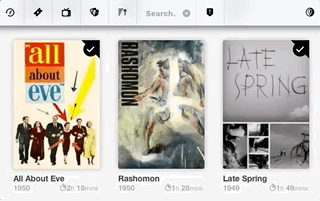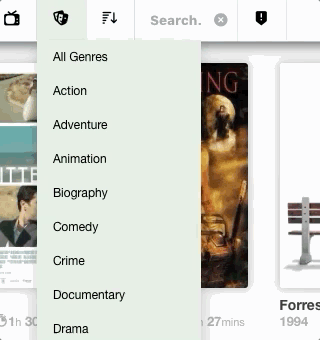Movie Catalog is a python script that fetches movie data from various sources (imdb,tmdb,youtube,google) and generates a user-friendly catalog for all the movies the user has inside a folder. I created it to best manage my watchlist and quickly scan for movie information without jumping from site to site. It can work however on things such as movie files, screenshots, subtitle collections, or torrent files, or simple text files as long as the filenames are indicative of a movie.
The resulting catalog can be found inside the index.html file.
(!) MovieCatalog is NOT a movie downloader.
MovieCatalog is filesystem-based meaning that it scans a specific folder (Source) for files and folders (eg. .srt files, video files, .torrent files or .txt files) and fetches the information for the movies extracted from the filenames. In other words, it treats the folder's content, as a list of movie names. The downloaded data are kept in a cache folder.
MovieCatalog does not run in the background but can be automated to run when a file is added or removed from a folder (eg via smart folders/Automator) - The .py script updates the catalog by scanning changes in the Source folder, fetching the data and rebuilding the monolithic index.html file and then quits.
You need only manage your movie files (Source). The script makes sure that there is parity between the source movie files/folders and the cached data. If a movie exists and its cache doesn't, it fetches the data. If a movie no longer exists, it deletes the orphaned cache silently.
Supports various sorting options, as well as filtering by media type (movie,tv series) or combined genres (by pressing Cmd/Ctrl)
MovieCatalog allows full-text searching inside keywords, synopsis, cast and crew data, alternative titles, ratings and things such as the release year etc.
The MovieCatalog index.html page is responsive, allows switching between light/dark mode easily and links to trailers in order to provide a one-stop experience to the user.
It displays the Director of Photography/Cinematographer since I find it quite important. There are links for the movies/shows and the cast/crew members to their respective IMDB and TMDB pages.
- Copy the files
main.py,DefaultSettings.py,templates/andresources/into a folder - Install Python3, get the dependencies (requirements.txt) and build the environment.
- In order to use the script, you need a free account at http://www.themoviedb.org
- request a free API key at https://developers.themoviedb.org/3/getting-started/introduction
- open the file
DefaultSettings.pyand paste the API key inside the quotes ofmyTMDB_APIkey='__________________'
- Find the absolute path of the folder where the movies are,
- open the file
DefaultSettings.pyand paste the absolute path inside the quotes ofSourcePath=''eg.SourcePath='/Users/User1/MyFiles/Movies/'
- Save the file.
- run
main.py -sto scan for new/deleted movie files and then rebuild the html file. When importing many files, there may be some random waiting intervals to prevent blacklisting on google.com - open
index.htmlin your browser
If the movie was matched to the wrong IMDB id, or not matched at all, or incomplete data was fetched:
- run
main.py -l unimported(unimported or all,ambiguous,verified,incomplete) to display the files that were affected. - run
main.py -c -f <filename> -i <new imdbID>with the filename and the correct IMDB ID(eg.main.py -c -f 'Vertigo.mp4' -i 0052357)
- run
main.pyto rebuild theindex.htmlwithout scanning for new/deleted files - run
main.py -?displays command-line parameters
pipenv run python3 main.py -s
It has been tested on Opera, Firefox and Safari and Python3. Tested with 700 movies. Since there is no actual database on the backend, more files mean slower performance overall
- get rid of the command-line interface and allow movie-meta editing via the app (django/flask)
- store data in an SQL database
- allow import from imdb watchlist
- allow scanning multiple locations




